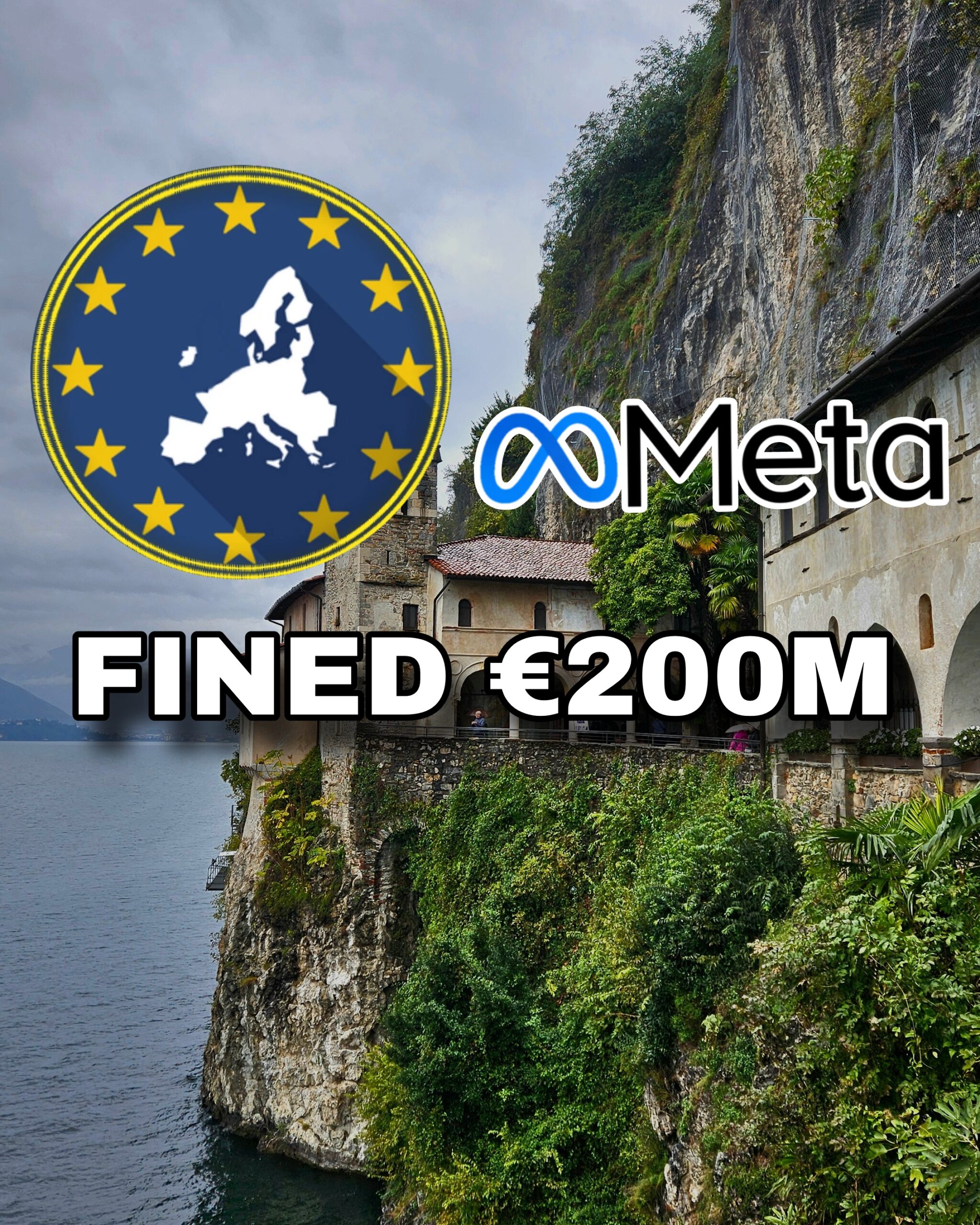Europe Turns Up the Heat on Big Tech
In a decisive move on April 23, 2025, the European Commission fined Meta Platforms Inc. €200 million ($228 million) under the Digital Markets Act (DMA). The ruling marks the EU’s most prominent action against Meta to date, reinforcing Europe’s ambition to regulate dominant digital platforms and protect consumer rights in the data economy.
This fine is part of a broader wave of antitrust and data privacy enforcement sweeping across the tech sector—and it brings renewed attention to Meta’s entrenched business model, which relies on large-scale personal data processing and aggressive platform integration.
Understanding the DMA: The EU’s New Legal Tool
The Digital Markets Act, enacted in November 2022 and enforced as of March 2023, targets so-called “gatekeepers”—tech companies with the power to control digital markets. Companies designated as gatekeepers must comply with strict obligations, including:
- Offering users real choices in data consent
- Allowing interoperability with third-party services
- Avoiding self-preferencing or tying practices
- Ensuring transparency around algorithmic recommendations
The DMA gives the European Commission enforcement authority to impose fines of up to 10% of a company’s global turnover, or 20% for repeat violations.
Meta’s Violation: “Pay or Consent” Model Under Scrutiny
Meta was found in breach of the DMA due to its “pay-or-consent” data policy, rolled out for users in the EU:
- Users were offered two options: pay for an ad-free version of Facebook and Instagram, or consent to the collection and processing of their personal data for behavioral advertising.
- Regulators ruled that this structure violated users’ right to genuine consent under the DMA and reinforced Meta’s control over the digital advertising market.
According to the European Commission, the choice presented by Meta was not truly free, because refusal to consent came with a cost—thus distorting competition and user autonomy.
Meta’s Response: Regulatory Bias Accusations
Meta strongly condemned the fine, issuing a combative statement:
“The European Commission is attempting to handicap successful American businesses while allowing Chinese and European companies to operate under different standards.”
The company insists its policy complies with both GDPR and the DMA, and has signaled plans to challenge the ruling in EU courts. Behind the scenes, Meta is also exploring technical revisions to its data consent architecture, aiming to introduce more granular privacy controls without dismantling its ad-driven revenue model.
A Pattern of Non-Compliance? Timeline of Major Meta Cases
Meta’s latest DMA fine fits into a long history of regulatory scrutiny across Europe and the United States. Here is a chronological timeline of the company’s most significant legal and regulatory encounters:
Timeline of Meta’s Legal and Regulatory History
| Year | Jurisdiction | Case / Action | Summary |
|---|---|---|---|
| 2012 | US (FTC) | Acquisition of Instagram | Meta (then Facebook) acquires Instagram for $1 billion. Approved by FTC, but later cited in antitrust lawsuits. |
| 2017 | EU (France/CNIL) | GDPR Investigations | Meta investigated for unauthorized tracking and profiling of users. |
| 2019 | EU Commission | €110M Fine – WhatsApp Deal | Meta fined for providing misleading information during its WhatsApp acquisition. |
| 2019 | US (FTC) | $5 Billion Settlement | Largest-ever privacy fine over the Cambridge Analytica scandal. |
| 2021–2022 | Ireland (DPC) | €390M GDPR Fine | Meta penalized for forcing users to accept personalized ads without proper consent. |
| 2023 | EU Commission | DMA Designation | Meta officially designated as a gatekeeper under the DMA. |
| 2024 | US DOJ | Antitrust Lawsuit – Ad Monopoly | DOJ sues Meta for anti-competitive conduct in social networking and advertising markets. |
| 2025 | EU Commission | €200M DMA Fine | Meta fined for coercive “pay-or-consent” data model under the Digital Markets Act. |
| Pending | US FTC | Instagram & WhatsApp Antitrust Reopeners | FTC reexamines the legality of Meta’s past acquisitions with potential for divestiture. |
Meta’s Path Forward: Legal Strategy and Compliance
Meta now has 60 days to comply with the EU’s decision or face further financial penalties or structural remedies. The company is pursuing a dual-track strategy:
- Legal Appeal: Meta plans to challenge the EU decision before the General Court of the European Union, arguing its practices are compatible with European privacy and competition law.
- Technical Fixes: Meta is reportedly testing modular consent frameworks that allow users to selectively opt in or out of data sharing categories without being locked into a binary choice.
Despite its public defiance, Meta appears to be quietly negotiating with the Commission and data protection authorities to reach a sustainable compliance model.
Conclusion: A Pivotal Moment for Platform Regulation
The €200 million DMA fine is more than a monetary penalty—it is a legal milestone that challenges how digital platforms extract value from user data. It forces Meta to reassess the trade-off between monetization and consent, and it validates the EU’s strategy of proactive, systemic regulation over ex-post antitrust enforcement.
As Meta defends its model in court and regulators weigh further actions, this case will likely define the next phase of platform accountability and reshape the economics of personalized advertising across Europe—and perhaps the globe.






